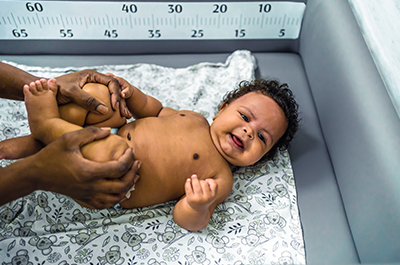Childhood vaccination rates are down nationwide. And we're not talking about the COVID-19 vaccines, but routine vaccines that have been given to children for decades to prevent diseases like polio, measles, mumps and whooping cough. In the state of Michigan, 31% of children ages 19 to 35 months are overdue for routine vaccinations. And at Henry Ford Health, about 10% fewer vaccines are being given than before the COVID-19 pandemic began.
“You really want to have a large number of people vaccinated so diseases don’t start circulating,” says Dennis Cunningham, M.D., medical director of infection control and prevention at Henry Ford Health. “Once you have enough people immunized against a disease, even if there is a case, it can’t keep spreading because the majority of people are immune. We’re well below that threshold with polio. We’re at 70% vaccinated, which makes me really nervous. If there was a case of polio in Michigan, it could spread quite quickly.”
The Dangers Of A Polio Outbreak
You may have heard there is a confirmed case of polio in New York, and that the virus has been found in wastewater in New York. The case was found in an area where vaccination rates are low, meaning the disease could—and maybe already has—spread. Childhood polio vaccination rates in Rockland County, where the case was confirmed, is about 60%.
Polio spreads by fecal-oral contact, meaning it is transmitted from feces to mouth. (That’s why it tends to be more of a pediatric disease, says Dr. Cunningham, as young kids don’t always thoroughly wash their hands with soap and water.)
Thanks to safe, effective vaccines, many of us haven’t lived during a time where polio has been a threat, but polio can cause paralysis and death. “I think, over time, people stopped seeing these diseases so they forgot how serious they are—and instead they think the vaccines are dangerous,” says Dr. Cunningham. “But it’s important to remember how many people died or were paralyzed because of a polio outbreak. Your muscles lose their tone, you aren’t able to contract them. And there really is no treatment. At that point it’s too late.”
The Centers for Disease Control and Prevention (CDC) recommends that children get four doses of the polio vaccine. They should get one dose at each of the following ages: 2 months old, 4 months old, 6 – 18 months old, and 4 – 6 years old.
After three doses of a polio vaccine, you are 99% protected from the disease. However, those with weakened immune systems may be more vulnerable. And while the CDC says people should be protected for many years after receiving the full vaccine series, it’s not known exactly how long immunity lasts.
“You can get a one-time polio booster as an adult, which the CDC recommends if you’re traveling to parts of the world where polio still exists,” says Dr. Cunningham. “But I’m really hoping people will get their children vaccinated so we can prevent that from happening.”
Why Are Vaccination Rates Down?
Measles, mumps, whooping cough—these are other diseases that can be prevented with routine childhood vaccination. “Whooping cough is a bacteria that makes you have a terrible cough,” says Dr. Cunningham. “In kids under 1 year of age, it can cause them to stop breathing. I’ve had children die of whooping cough in the hospital. We can give them antibiotics, but sometimes it doesn’t always work. You can get cracked ribs from coughing so badly. It’s a really frightening disease.”
So with the threat of these preventable illnesses, why have vaccination rates gone down? “Some people are still reluctant to come back to the doctor’s office for fear of contracting COVID-19,” says Michelle Day, M.D., a pediatrician at Henry Ford Health. “I’ve also seen hesitancy and misinformation about the COVID-19 vaccines and that has trickled into hesitancy and misinformation about other vaccines that we’ve been routinely offering for decades.
“If families are hesitant about vaccination, I encourage them to make an appointment to see their pediatrician—because nothing can really replace a face-to-face conversation with a pediatrician they trust.”
To find a pediatrician at Henry Ford Health, visit henryford.com or call 1-800-436-7936.
Dr. Dennis Cunningham is the medical director of infection control and prevention at Henry Ford Health.
Dr. Michelle Day is a primary care pediatrician at Henry Ford Health. She sees patients at Henry Ford Medical Center—Farmington Road.



